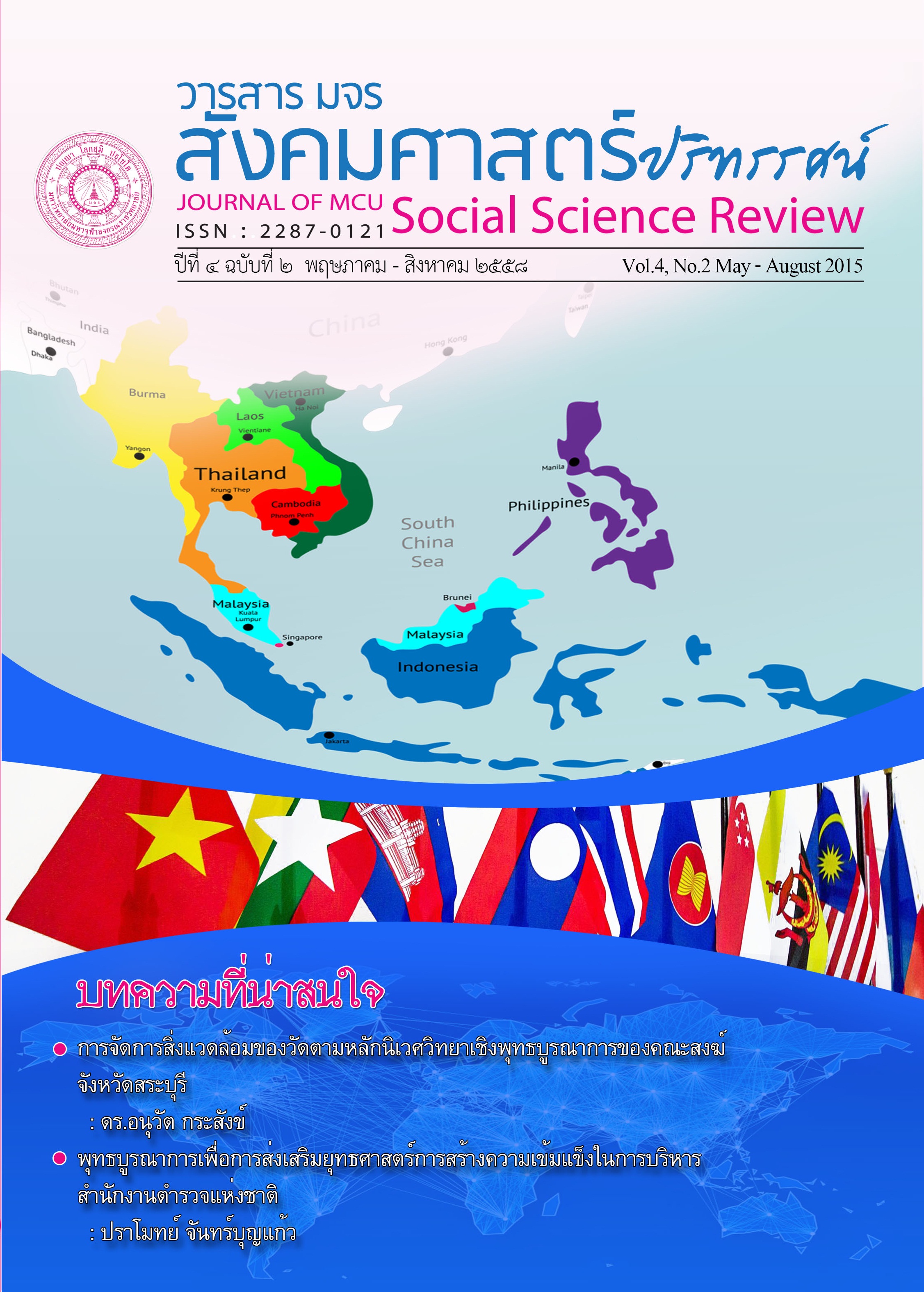การจัดการสิ่งแวดล้อมของวัดตามหลักนิเวศวิทยาเชิงพุทธบูรณาการ ของคณะสงฆ์จังหวัดสระบุรี
คำสำคัญ:
การจัดการสิ่งแวดล้อม, นิเวศวิทยา, พุทธบูรณาการบทคัดย่อ
การวิจัยครั้งนี้มีวัตถุประสงค์ ๑) เพื่อศึกษาสภาพปัจจุบันและปัญหาในการจัดการสิ่งแวดล้อมของวัดในจังหวัดสระบุรี ๒) เพื่อศึกษากระบวนการจัดการสิ่งแวดล้อมตามหลักนิเวศวิทยาเชิงพุทธบูรณาการของคณะสงฆ์จังหวัดสระบุรี และ ๓) เพื่อเสนอแนวทางการจัดการสิ่งแวดล้อมตามหลักนิเวศวิทยาเชิงพุทธบูรณาการของคณะสงฆ์จังหวัดสระบุรี ระเบียบวิธีวิจัยเป็นการวิจัยเชิงคุณภาพ (Qualitative research) ใช้วิธีการศึกษาวิจัยเอกสาร (Documentary research) โดยการสัมภาษณ์บุคคลแบบเจาะลึก (In-depth interview) เก็บข้อมูลจากผู้ให้ ข้อมูลหลัก จำนวน ๒๕ รูป/คน ด้วยแบบสัมภาษณ์เชิงลึกที่มีโครงสร้าง วิเคราะห์ข้อมูลด้วย การพรรณนาความ
ผลการวิจัยพบว่า
๑. สภาพปัจจุบันและปัญหาในการจัดการสิ่งแวดล้อมของวัดในจังหวัดสระบุรี พบว่าปัญหาในการจัดการสิ่งแวดล้อมของวัดดังกล่าว มีอยู่ ๓ ประการ ได้แก่ ๑) ปัญหาขยะมูลฝอยที่เกิดขึ้นจากแหล่งท่องเที่ยวบนพื้นที่ภายในวัด ๒) การปรับปรุงภูมิทัศน์ของวัดในบางส่วนที่ต้องปรับปรุงใหม่ได้ถูกต่อต้านจากชุมชน ๓) การส่งเสริมการศึกษาและจิตสำนึก วัดได้กำหนดให้เด็กเยาวชนมาศึกษาเรียนรู้พระพุทธศาสนาในวันเสาร์-อาทิตย์ สร้างความรู้ด้วยการทำกิจกรรมต่างๆ
๒. กระบวนการจัดการสิ่งแวดล้อมตามหลักนิเวศวิทยาเชิงพุทธบูรณาการของคณะสงฆ์จังหวัดสระบุรี วัดควรที่จะส่งเสริมบทบาทการมีส่วนร่วมของพุทธศาสนิกชนตามหลักอปริหานิยธรรม ดังนี้ ๑) ความพร้อมเพรียงในการจัดการประชุมเพื่อทบทวนการดำเนินงานตามโครงการที่ได้เสนอไว้โดยพุทธศาสนิกชน ๒) ความพร้อมเพรียงของเครือข่ายด้านสิ่งแวดล้อม แสดงการสรุปผลการประเมินโครงการแต่ละโครงการ ๓) ความพร้อมเพรียงในการให้ความสำคัญแก่พุทธศาสนิกชนซึ่งทำงานด้านสิ่งแวดล้อม และกลุ่มคุ้มครองปกป้องศาสนสถาน ๔) ความพร้อมเพรียงในการไม่ละเมิดกฎกติกา ระเบียบกฎหมายบ้านเมือง ๕) การสร้างจิตสำนึกและการสร้างองค์ความรู้ให้กับเด็ก เยาวชน และนักศึกษา ๖) ความพร้อมเพรียงกันในการให้มีการดำเนินคดีต่อผู้กระทำผิดจากเจ้าหน้าที่รัฐ ๗) การจัดการทำเวทีชาวบ้าน การทำประชาพิจารณ์ การทำประชาสังคมควรส่งเสริม ๘) การสนับสนุนงบประมาณจากวัด ต้องมีความเท่าเทียมและยุติธรรมสำหรับการจัดการสิ่งแวดล้อม
๓. แนวทางการจัดการสิ่งแวดล้อมตามหลักนิเวศวิทยาเชิงพุทธบูรณาการของคณะสงฆ์จังหวัดสระบุรี ดังนี้ ๑) การสร้างเครือข่ายกับหน่วยงานด้านสิ่งแวดล้อมอย่างศักยภาพ ๒) กำหนดแผนงานประจำปีอย่างสม่ำเสมอ ๓) ความพร้อมเพรียงในการประชุม ๔) แผนการไม่บัญญัติกฎ กติกาเพิ่มเติมและลบล้างกฎเดิม ๕) แผนการให้ความเคารพผู้นำ ๖) แผนการปกป้องและให้ความสำคัญต่อพุทธศาสนิกชนในพื้นที่ ๗) แผนการให้ความเคารพกับสถานที่ศักดิ์สิทธิ์ ปกป้องสถานที่สำคัญทางวัตถุโบราณหรือสถานที่สำคัญทางประวัติศาสตร์ให้สอดคล้องกับการดูแลสภาพแวดล้อม
เอกสารอ้างอิง
(๑) หนังสือ:
พระราชวรมุนี (ประยุทธ์ ปยุตฺโต). สถาบันสงฆ์กับสังคมไทย. กรุงเทพมหานคร : สำนักพิมพ์มูลนิธิโกมลคีมทอง, ๒๕๒๗.
สมานจิต ภิรมย์รื่น. วัดพัฒนาตัวอย่าง ปี ๔๑. กรุงเทพมหานคร : โรงพิมพ์การศาสนา, ๒๕๔๑.
(๒) วารสาร:
จำนงค์ อดิวัฒนสิทธิ์. พุทธศาสนากับนิเวศวิทยา. วารสารสังคมศาสตร์และมนุษยศาสตร์. ๑๒, ๑ (ม.ค.-ก.พ. ๒๕๒๕).
(๓) วิทยานิพนธ์/รายงานวิจัย:
ปกรณ์ ตันสกุล. “การศึกษาสภาพปัญหาการบริหารงานของพระสังฆาธิการในวัดพัฒนาตัวอย่าง”. วิทยานิพนธ์ครุศาสตรมหาบัณฑิต. บัณฑิตวิทยาลัย : มหาวิทยาราชภัฏบ้านสมเด็จเจ้าพระยา, ๒๕๔๖.
ปิยะภรณ์ วรประโยชน์. “มลพิษทางทัศนียภาพของวัดจากการบดบังของสาธารณูปโภค-สาธารณูปการ ในเทศบาลเมืองเชียงใหม่ จังหวัดเชียงใหม่”. วิทยานิพนธ์วิทยาศาสตรมหาบัณฑิต. บัณฑิตวิทยาลัย : มหาวิทยาลัยเกษตรศาสตร์, ๒๕๕๑.
พรพิมล วิกรัยพัฒน์. “การจัดการขยะในครัวเรือนชุมชนช่างเคี่ยน จังหวัดเชียงใหม่”. รายงานการวิจัย. สถาบันวิจัย: มหาวิทยาลัยเทคโนโลยีราชมงคลล้านนา, ๒๕๕๐.
พระพงษ์เพชร แสนสามารถ. การดำเนินงานด้านสิ่งแวดล้อมของวัดในเขตปกครองคณะสงฆ์กรุงเทพมหานคร. สารนิพนธ์รัฐประศาสนศาสตรมหาบัณฑิต สาขาวิชานโยบายสาธารณะ. บัณฑิตวิทยาลัย : มหาวิทยาลัยนเรศวร, ๒๕๕๒.
มานิตย์ เขียวดารา. “การบริหารจัดการขยะมูลฝอยในพื้นที่จังหวัดกาญจนบุรี”. รายงานการวิจัย, (สาขาวิทยบริการเฉลิมพระเกียรติ: มหาวิทยาลัยรามคำแหง, ๒๕๕๒.
รุ่งรัตน์ ลัพเจริญวงศ์. สภาวะและคุณภาพด้านอนามัยสิ่งแวดล้อมของวัดในพระพุทธศาสนาซึ่งอยู่ในเขตกรุงเทพมหานคร. วิทยานิพนธ์วิทยาศาสตรมหาบัณฑิต. บัณฑิตวิทยาลัย : มหาวิทยาลัยมหิดล, ๒๕๕๓.
รุ่งโรจน์ คำแน่น. “ปัจจัยที่มีความสัมพันธ์ต่อบทบาทการพัฒนาชุมชนของเจ้าอาวาส : ศึกษาเฉพาะกรณีจังหวัดเพชรบุรี”, วิทยานิพนธ์ศิลปศาสตรมหาบัณฑิต. บัณฑิตวิทยาลัย: มหาวิทยาลัยเกษตรศาสตร์, ๒๕๓๙.
วีระโชติ รัตนกุล. สภาพปัญหาอนามัยสิ่งแวดล้อมของวัดในสามจังหวัดชายแดนภาคใต้, วิทยานิพนธ์สาธารณสุขมหาบัณฑิต. บัณฑิตวิทยาลัย : มหาวิทยาลัยบูรพา, ๒๕๕๒.
สมคิด เพ็งอุดม. “บทบาทของพระสงฆ์ที่มีต่อการพัฒนาชุมชนตามทรรศนะของพระสงฆ์และเจ้าหน้าที่กระทรวงหลักระดับตำบลในจังหวัดสมุทรสงคราม”. วิทยานิพนธ์การศึกษามหาบัณฑิต. บัณฑิตวิทยาลัย : มหาวิทยาศรีนครินทรวิโรฒประสานมิตร, ๒๕๓๕.
๒. ภาษาอังกฤษ
(I) Books:
Clark. John J.. Outline of Local Government of The United Kingdom. London: SirIssac Pitman And Son Ltd., 1957.
Mongtagu. Harris G., Comparative Local Government. Great Britain: William Brendon and Son Ltd., 1984.
Robson. William A., Local Government in Encyclopedia of Social Science, Vol. x.
New York: The Macmillan Company, 1953.
Tchobanoglous.G.Theisen.H..& Vigil. S.. Integrated Solid Waste Management: Engineering
Principle and Management Issues. New York: McGraw-Hill, 1993.
ดาวน์โหลด
เผยแพร่แล้ว
รูปแบบการอ้างอิง
ฉบับ
ประเภทบทความ
สัญญาอนุญาต
ลิขสิทธิ์ (c) 2018 วารสาร มจร สังคมศาสตร์ปริทรรศน์

อนุญาตภายใต้เงื่อนไข Creative Commons Attribution-NonCommercial-NoDerivatives 4.0 International License.
เพื่อให้เป็นไปตามกฎหมายลิขสิทธิ์ ผู้นิพนธ์ทุกท่านต้องลงลายมือชื่อในแบบฟอร์มใบมอบลิขสิทธิ์บทความให้แก่วารสารฯ พร้อมกับบทความต้นฉบับที่ได้แก้ไขครั้งสุดท้าย นอกจากนี้ ผู้นิพนธ์ทุกท่านต้องยืนยันว่าบทความต้นฉบับที่ส่งมาตีพิมพ์นั้น ได้ส่งมาตีพิมพ์เฉพาะในวารสาร มจร สังคมศาสตร์ปริทรรศน์ เพียงแห่งเดียวเท่านั้น หากมีการใช้ภาพหรือตารางหรือเนื้อหาอื่นๆ ของผู้นิพนธ์อื่นที่ปรากฏในสิ่งตีพิมพ์อื่นมาแล้ว ผู้นิพนธ์ต้องขออนุญาตเจ้าของลิขสิทธิ์ก่อน พร้อมทั้งแสดงหนังสือที่ได้รับการยินยอมต่อบรรณาธิการ ก่อนที่บทความจะได้รับการตีพิมพ์ หากไม่เป็นไปตามข้อกำหนดเบื้องต้น ทางวารสารจะถอดบทความของท่านออกโดยไม่มีข้อยกเว้นใดๆ ทั้งสิ้น





